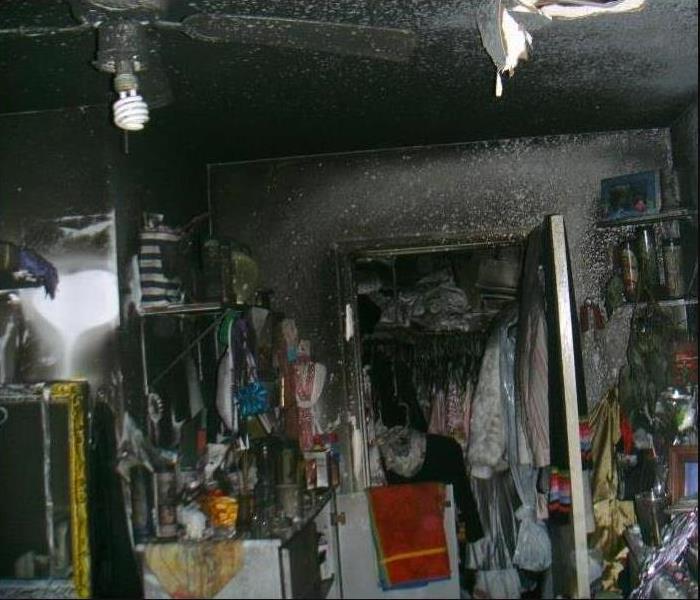8 Ways To Prevent Fires
7/11/2022 (Permalink)
8 Fire Prevention Methods
1. Have smoke alarms installed
Fires often occur at night when you’re asleep and spread so rapidly that some people are overcome by fumes before they even wake up. Smoke alarms will give you early warning and save lives.
Smoke alarms will be most useful if placed:
• Near a doorway or stairway (on the ceilings)
• On every floor of the house
• In each bedroom or at least in the corridor outside each sleeping area.
• In the kitchen (every so often, you might get a “false” alarm when you’re cooking. If you turn it off, don’t forget to turn it back on!)
2. Have fire extinguishers
Fire extinguishers. That’s plural, as in more than one. Many people just have one for the kitchen, but you should have one in every room, especially if you have a fireplace or use space heaters. Don’t forget the garage and attic, places where people store gas cans, old clothes, and lots of other combustible stuff.
3. Watch the wiring
Electrical fires can be some of the most dangerous, so keep a close eye out for frayed wiring, especially if you have pets in the home. Especially puppies who like to chew on everything. Other pets, like cats or adult dogs, might urinate on sockets while marking territory. Unintended “pets”, like mice and rats, can also do damage by gnawing on wires.
Also:
• Never run electrical cords under rugs or furniture. Not only are these things combustible, but you can’t see if the cord is frayed or has been damaged.
• Overloaded electrical sockets are a major cause of fires. If lights are flickering or your breakers are tripping frequently, you’ve got a problem. In these cases, the light switch or receptacle plate may feel hot. Get it replaced immediately by a professional.
• Loose plugs that don’t fit snugly into sockets can cause sparks and heat buildup.
• Never try to force a three-prong plug into a two-plug outlet.
4. Be careful cooking
If you’re frying or grilling food, stay in the kitchen! Even a short time out of the room might allow a fire to go unnoticed until it’s too late. Don’t cook with a stove, oven, or grill if you’re sleepy or if you’ve been drinking alcohol. A microwave oven is safer, but fires are still a risk.
Don’t wear long flowing sleeves when you’re cooking, even if you’re used to wearing a house robe while getting the kids ready for school in the morning. Speaking of kids, keep them 3 feet away your stove or oven; children are notoriously curious about fire and heat.
If you’re cooking with oil, it’s a good idea to have a lid handy for the pan you’re using. A lid would suffocate the fire and give you time to turn the oven off. Don’t try to move the pan or throw water on the burning oil, it will splatter and burn you.
5. Monitor and maintain other appliances
• The lint trap in your clothes dryer, if left clogged, can cause fires by overheating the appliance. Clean it out after each load.
• Houses with furnaces have a built-in fire hazard and have to watch it closely. Replace filters diligently and keep clutter several feet away. Let professionals establish and monitor settings and do needed repairs and maintenance.
• Portable space heaters are handy, but be certain to remove any nearby combustible clutter at least 3 feet away in every direction. Get a heater that has an automatic shutoff function if it falls over.
• Operate and re-fuel portable generators only outdoors, where there is adequate ventilation.
6. Keep the small fry away from the flames
Kids are notoriously curious about fire and flames. Teach them that fire is not a toy, it’s a tool.
Establish a few rules:
• Kids stay 3 feet away from cooking stoves and fireplaces, as mentioned earlier, except under your direct supervision.
• Kids do not handle matches, lighters, or lighted candles, except under your direct supervision.
• Kids don’t use barbeque grills, except under your direct supervision.
• Kids are to follow established escape routes in a fire (more below)
7. Use sense if you smoke
Smoking is a fire hazard, so avoid the activity inside the house and, especially, don’t smoke in bed. Avoid smoking when you’re drowsy, on certain meds, or have been drinking alcohol. Make sure that all cigarettes and cigars are completely out before you toss them in the trash or, better yet, have an ashtray with sand in it available.
Never smoke in a home in which someone uses oxygen. Oxygen is extremely flammable, even explosive.
8. Establish escape plans
You should be already looking around the house for at least 2 ways to make a rapid exit from the house. If there’s a second floor, the family should know how to easily open the windows and deploy a ladder, in case they can’t get downstairs. Conduct fire drills regularly so that everyone knows exactly what to do in a fire, with a designated meeting spot outside the home.
You might not be able to protect your family from every calamity. With a little planning and some common sense, however, you’ll be able to spot every fire hazard short of a flaming meteorite hitting your home. Find those hazards and eliminate them and your home will become a whole lot safer.





 24/7 Emergency Service
24/7 Emergency Service